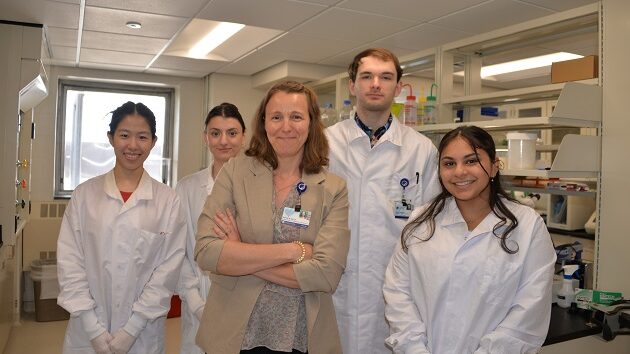$2.6M NIH Grant Awarded to Study Nerve Repair

Research will focus on the role of the protein PMP2 in peripheral neuropathy
The National Institutes of Health (NIH) has awarded scientists at Albany Medical College a five-year, $2.6 million grant to study the role of a specific protein in peripheral nerve disorders.
The study will focus on peripheral demyelinating neuropathies, which affect approximately three million people worldwide. Symptoms occur most often in the hands and feet and include numbness, muscle weakness, fatigue, and chronic pain. Foot ulcers and amputation can result in the most severe cases.
“This type of neuropathy can be genetic or can be caused by a traumatic injury, infection, metabolic disease, or exposure to toxins,” said Sophie Belin, PhD, assistant professor in the Department of Neuroscience and Experimental Therapeutics, who is leading the study. “Regardless of the specific cause, it is damage to myelin – the protective sheath that wraps around nerves – that causes the debilitating symptoms.”
Currently, medications are available to help ease symptoms, but there is no treatment that targets the disease itself by helping new myelin to form.
Using mouse models, Dr. Belin and her team will focus on the peripheral myelin protein 2 (PMP2), which is thought to stabilize myelin. The researchers will seek to understand its role as a fatty acid chaperone and how modulating its expression could regulate nerve repair. They’ll also study the molecular factors that regulate PMP2.
“Clarifying the function of PMP2 in myelin cells could lead to new discoveries on how to enhance remyelination, as well as shed light on potential pharmacological approaches that could target PMP2,” said Dr. Belin.
Titled, “Role of a Fatty Acid Chaperone in Schwann Cell Myelination,” the study is funded by the NIH’s National Institute of Neurological Disorders and Stroke (NINDS).
As part of a separate award, Dr. Belin and Yannick Poitelon, PhD, associate professor in the Department of Neuroscience and Experimental Therapeutics, also received a two-year, $163,500 grant from the NINDS in support of a study on Charcot-Marie-Tooth disease, another type of nerve disorder, titled, “Exploring the Pathophysiology of CMT1G”.